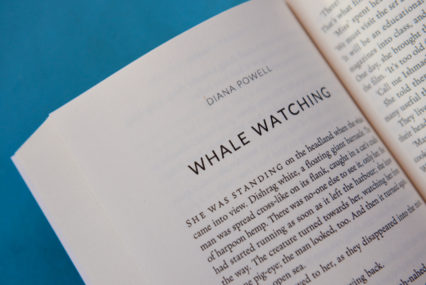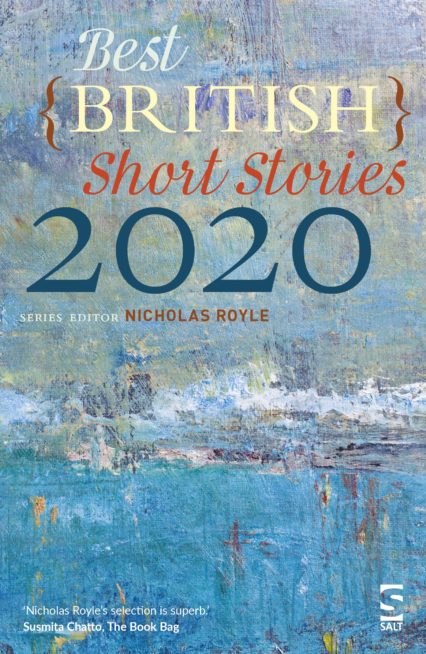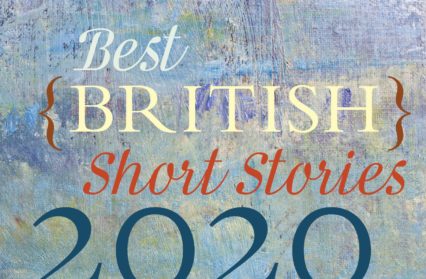‘Whale Watching’, a story by Welsh writer Diana Powell, is included in the Best British Short Stories anthology for 2020, alongside work by Hanif Kureishi, David Constantine, Irenosen Okojie and K.J. Orr. Here, Powell reveals the story’s background and the challenges she has faced since writing it.

The Best British Short Stories anthology aims to be just that – the gathering together of the best stories published in the previous calendar year. And there are plenty to choose from, with editor Nicholas Royle – acclaimed author, Reader at Manchester Writing School – trawling through journals, collections, anthologies, websites and newspapers to make his selection. Competition is fierce, and some of the finest exponents of the form are included. So, to find me among them, with my story ‘Whale Watching’ is both an honour… and a surprise.
I’m the only Welsh writer included this year, which is an added source of pride; I’m Welsh-born, bred and educated, now living in the far west of the country, in beautiful Pembrokeshire. And that’s where the story is set. It takes place in and around Fishguard, my local town, and is based on a true event from several decades ago.
This, in itself, is quite unusual for me. My short story collection, Trouble Crossing the Bridge (Chaffinch Press), is described as a melting pot of personalities, voice, setting and plot. Four stories are set in America, two in France and one in Denmark. Most of the characters inhabit existences far removed from my own; in fact, one of my favourite writing rules, breaking with a long creative writing tradition (Kurt Vonnegut et al), is to write about what you don’t know. Use your imagination to visit unknown worlds and minds. With ‘Whale Watching’, there was a deliberate decision to break with the norm and bring the story closer to home, while still looking for that ‘unknown’ element.
I began to look around for interesting events in Fishguard’s history, quickly discarding the famous last invasion of Britain as too obvious. Another well-known happening was the filming of ‘Under Milk Wood’ starring Richard Burton (too well-documented). But there had been another film made in the town back in the 1950s – ‘Moby Dick’, based, of course, on Herman Melville’s Great American Novel, starring Gregory Peck as Captain Ahab, directed by John Huston. The rumours surrounding this particular filming are legendary. Was there a life-size white whale? One? Two? Three? Did Gregory Peck get swept out to sea, strapped to its flank? Did the coast guard have to be called? It is hard to discover the truth from… not, perhaps, ‘lies’, but ‘fabrications for the purposes of publicity’. This would form the basis of my story. Seeing the filming was the highlight of the narrator’s childhood and remained the greatest excitement of her life: she is obsessed with it, as Ahab was obsessed with the whale. But what she remembers is not necessarily what happened.

Where did my main character and her obsession come from? I have no idea. Or… she came from my endless mulling over the bones of the tale, in search of the right voice. However the story came into being, when I’d finished it, I was pleased. I felt I had written something worthwhile; I was sure, in fact, that it was one of my best. But would anyone else agree? A story has another life once it is finished, if you, the writer, decide to send it out into the world – if you do not write simply for yourself, but want it to be read by others, and, ideally, to be validated in some way. I decided to enter it in a competition run by one of my favourite magazines – somewhere I had submitted too often, with no luck. This time, I was convinced it would be different… but there was nothing. Not a long-listing, not an honourable mention (both of which are important). Nothing.
It is easy for writers to sink into a depression about their work at this point – when you think a story is good and have foolishly raised your hopes, the blow can be particularly hard, leading to that ‘what’s the point of carrying on?’ frame of mind. But for some reason, this time, I decided I would do the writer’s equivalent of getting straight back on your bike and would submit my story elsewhere straight away. I happened to notice that the Chipping Norton Literature Festival Prize was just a day or two from the deadline, and I got my story sent off just in time. And won. The competition judge called the story ‘masterful’ and said he loved it. That judge just happened to be Nicholas Royle.
At around the same time, I faced rejection for ‘The Cabinet of Immortal Wonders’, another piece I had been happy with, but, again, instead of returning it to the technological equivalent of the bottom drawer, I sent it straight out later that day. The Irish journal The Blue Nib had a call-out for fiction, so I sent it off, and within twenty-four hours I had a response – my fastest ever. They loved it, and would certainly publish it. At their next call-out, I sent another story, ‘The Woman Who Never Begs’, which had been long-listed for the Sean O’Faolain Prize, and, again, another acceptance. The Blue Nib certainly seemed to like my work, and so, when I discovered editor Dave Kavanagh was in the process of developing a book imprint, I sent off a sample of my short story collection. Very quickly, he asked to read the full manuscript. Very soon, I was thrilled to hear that he wanted to publish it.
Of course, between then and now, a pandemic intervened, creating delays in editing and publication. But, in July, Trouble Crossing the Bridge was released, The Blue Nib imprint having taken on a separate identity as Chaffinch Press. The collection includes all the stories mentioned above, along with several others. Around April, ‘Whale Watching’ was short-listed for the prestigious Society of Authors ALCS Tom-Gallon Trust Award and went on to be chosen as runner-up. And now, Best of British Short Stories 2020 is out, with ‘Whale Watching’ on board.
Writing is full of highs and lows. There have been plenty of rejections between these high spots. There will be plenty more again. But it is heartening to feel that rejection – or at least my response to it – played its part in my run of success. Of course, luck is in there, too – different writers, different editors/judges (thank you, Nicholas Royle and Dave Kavanagh), different choices. But keeping going, never giving up – these bring their own rewards… sometimes in actual success, sometimes through pride at one’s resilience.
Diana Powell’s short story collection, Trouble Crossing the Bridge is available from Chaffinch Press. Best British Short Stories 2020 which includes Diana Powell‘s story is available from Salt.
A selection of short stories written by Wales Arts Review writers is available here.












